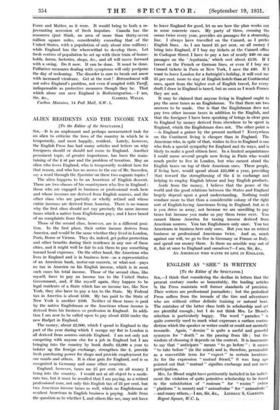ENGLISH AS " SHE " IS WRITTEN [To the Editor
of the SPEc-rxroa.] SIR,—I think that considering the decline in letters that the present century marks so lamentably, the leading articles
in the Press maintain well former standards of precision.
Their writers are professional journalists ; but the periodical Press suffers from the inroads of the tiro and adventurer who arc without either definite training or natural bent.
The mistakes of the latter class both in scholarship and art are plentiful enough ; but I do not think Mrs. Le Blond's selection is particularly happy. The word " paradox " is quite correctly used to mark what expresses a surface contra- diction which the speaker or writer could or could not mentally reconcile. Again, " demise " is quite a useful and graceful synonym for " death " as the passing from life ; but the wisdom of choosing it depends on the context. It is inaccurate to say that " anticipate " means " to go before " : it means " to take before " (in the mind) and is, therefore, permissible as a convertible term for " expect " in certain locutions. As for the expression " mutual friend," it was long ago pointed out that " mutual " signifies exchange and not mere participation.
Mrs. Le Blond might have pertinently included in his indict- ment the violation of quite primitive scholarship to be found in the substitution ' of " rostrum " fot "rostra " (when " platform" is meant) and " anirnalculae " for " animalenla —.and many others...,—I am, Sir, &c., LINDSAY S, GA.RRETT.
Regent Square, W.C.


































 Previous page
Previous page